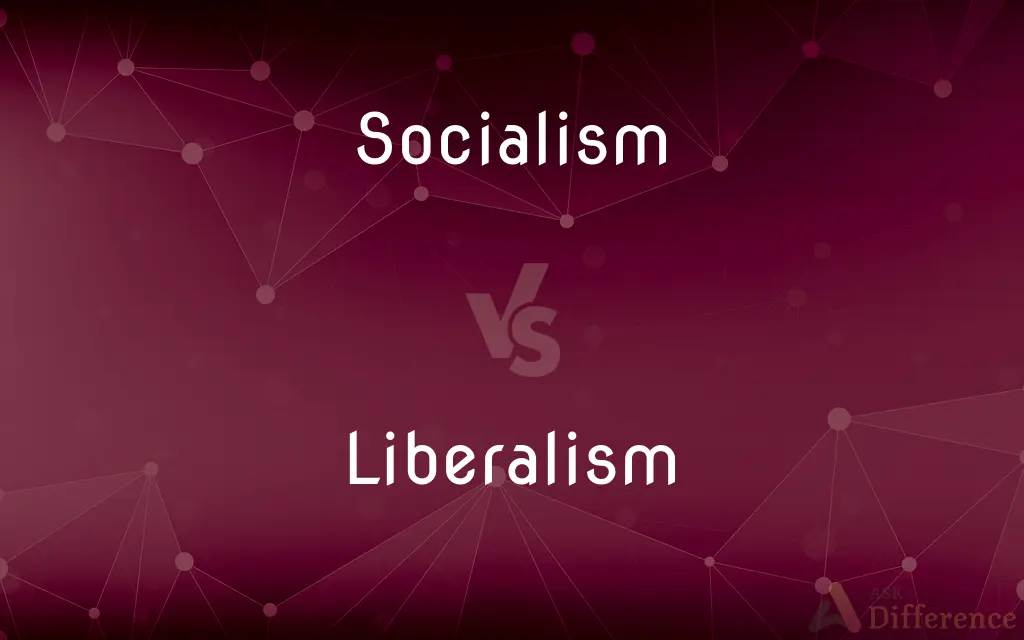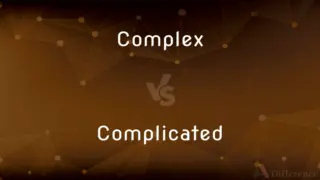Socialism vs. Liberalism — What's the Difference?
By Tayyaba Rehman — Updated on October 12, 2023
Socialism emphasizes collective ownership of means of production, prioritizing equality. Liberalism emphasizes individual rights and freedom, often within a capitalist framework.

Difference Between Socialism and Liberalism
Table of Contents
ADVERTISEMENT
Key Differences
Socialism and Liberalism are two distinct political and economic ideologies, each with its own foundational principles. Socialism, in essence, is rooted in the idea of collective or state ownership of the primary means of production and distribution of goods. It champions the idea that society should ensure everyone has equal access to resources and opportunities. On the contrary, Liberalism is rooted in the belief in individual rights, freedom, and equal protection under the law.
In an economic context, Socialism often means that significant industries and resources, like healthcare, utilities, and even education, might be publicly owned or heavily regulated to ensure public welfare. Liberalism, while it can support state intervention in the market, is typically more inclined to allow market forces to operate with more freedom, believing that individual entrepreneurial efforts can lead to societal benefits.
Socialism can sometimes be seen as a response to the inequalities generated by unrestrained capitalism. It can argue for wealth redistribution and welfare policies to ensure everyone has a basic standard of living. Liberalism, while also caring about societal welfare, tends to seek a balance between individual rights and state intervention, believing that individual freedom can lead to innovation and progress.
It's essential to note that these ideologies aren't mutually exclusive. Many modern societies incorporate elements of both. For instance, a nation might promote individual liberties and free markets, characteristic of Liberalism, while also having social safety nets or public health care, reflecting Socialist principles.
Comparison Chart
Core Philosophy
Collective ownership of means of production.
Emphasis on individual rights and freedoms.
ADVERTISEMENT
Economic Approach
Often promotes public ownership or strong regulation.
Leans towards free-market capitalism.
View on Inequalities
Seeks to eradicate through redistribution.
Balances individual rights and societal welfare.
State Intervention
Typically higher to ensure societal welfare.
Supports when necessary but values market freedom.
End Goal
Economic equality and collective welfare.
Balancing individual freedoms with societal needs.
Compare with Definitions
Socialism
An ideology emphasizing collective or governmental ownership and administration.
Socialism seeks to reduce income disparities in society.
Liberalism
A political ideology valuing individual freedoms and rights.
The American Constitution is often viewed as a foundational document of Liberalism.
Socialism
A system where means of production, distribution, and exchange are owned or regulated by the community.
Some Scandinavian countries integrate aspects of Socialism in their welfare models.
Liberalism
A worldview that prioritizes individual autonomy and consent in governance.
Liberalism opposes authoritarian rule and supports democratic institutions.
Socialism
Emphasis on the welfare and equality of all members of a society.
Socialism often supports strong social safety nets.
Liberalism
An economic stance favoring free market capitalism with limited government intervention.
Liberalism believes in the invisible hand of the market.
Socialism
The belief in reducing private property rights in favor of community ownership.
Under Socialism, major industries might be nationalized.
Liberalism
A belief in equality and protection of all individuals under the law.
Liberalism champions both civil rights and civil liberties.
Socialism
Socialism is a political, social, and economic philosophy encompassing a range of economic and social systems characterised by social ownership of the means of production. It includes the political theories and movements associated with such systems.
Liberalism
Advocacy for reform and progress in societal structures.
Liberalism has been a driving force behind many social reform movements.
Socialism
Any of various theories or systems of social organization in which the means of producing and distributing goods is owned collectively or by a centralized government that often plans and controls the economy.
Liberalism
Liberalism is a political and moral philosophy based on liberty, consent of the governed and equality before the law. Liberals espouse a wide array of views depending on their understanding of these principles, but they generally support individual rights (including civil rights and human rights), democracy, secularism, freedom of speech, freedom of the press, freedom of religion and a market economy.
Socialism
The stage in Marxist-Leninist theory intermediate between capitalism and communism, in which the means of production are collectively owned but a completely classless society has not yet been achieved.
Liberalism
The state or quality of being liberal.
Socialism
Any of various economic and political theories advocating collective or governmental ownership and administration of the means of production and distribution of goods.
Liberalism
A political theory founded on the natural goodness of humans and the autonomy of the individual and favoring civil and political liberties, government by law with the consent of the governed, and protection from arbitrary authority.
Socialism
A system of social and economic equality in which there is no private property.
Liberalism
Often Liberalism The tenets or policies of a Liberal party.
Socialism
A system or condition of society in which the means of production are owned and controlled by the state.
Liberalism
An economic theory in favor of laissez-faire, the free market, and the gold standard.
Socialism
(Marxism-Leninism) The intermediate phase of social development between capitalism and communism in Marxist theory in which the state has control of the means of production.
Liberalism
A 19th-century Protestant movement that favored free intellectual inquiry, stressed the ethical and humanitarian content of Christianity, and de-emphasized dogmatic theology.
Socialism
Any of a group of later political philosophies such democratic socialism and social democracy which do not envisage the need for full state ownership of the means of production nor transition to full communism, and which are typically based on principles of community decision making, social equality and the avoidance of economic and social exclusion, with economic policy giving first preference to community goals over individual ones.
Liberalism
A 19th-century Roman Catholic movement that favored political democracy and ecclesiastical reform but was theologically orthodox.
Socialism
Any left-wing ideology, government regulations, or policies promoting a welfare state, nationalisation, etc.
Liberalism
The quality of being liberal.
Socialism
A theory or system of social reform which contemplates a complete reconstruction of society, with a more just and equitable distribution of property and labor. In popular usage, the term is often employed to indicate any lawless, revolutionary social scheme. See Communism, Fourierism, Saint-Simonianism, forms of socialism.
[Socialism] was first applied in England to Owen's theory of social reconstruction, and in France to those also of St. Simon and Fourier . . . The word, however, is used with a great variety of meaning, . . . even by economists and learned critics. The general tendency is to regard as socialistic any interference undertaken by society on behalf of the poor, . . . radical social reform which disturbs the present system of private property . . . The tendency of the present socialism is more and more to ally itself with the most advanced democracy.
We certainly want a true history of socialism, meaning by that a history of every systematic attempt to provide a new social existence for the mass of the workers.
Liberalism
(politics) Any political movement founded on the autonomy and personal freedom of the individual, progress and reform, and government by law with the consent of the governed.
Socialism
A political theory advocating state ownership of industry
Liberalism
(economics) An economic ideology in favour of laissez faire and the free market (related to economic liberalism).
Socialism
An economic system based on state ownership of capital
Liberalism
Liberal principles; the principles and methods of the liberals in politics or religion; specifically, the principles of the Liberal party.
Socialism
A transitional phase between capitalism and communism in Marxist theory.
Marx believed Socialism would precede the final stage of communism.
Liberalism
A political orientation that favors progress and reform
Liberalism
An economic theory advocating free competition and a self-regulating market and the gold standard
Common Curiosities
Is Socialism the same as Communism?
No, though related, Socialism is often seen as a transitional phase towards Communism in Marxist theory.
Is Liberalism only about economic freedom?
No, Liberalism encompasses both political and economic freedoms.
Are Socialism and Communism the same thing?
No, while both advocate for collective ownership, communism seeks a classless, stateless society, whereas socialism can exist within various political structures, including democracies.
How have the definitions of Liberalism and Socialism evolved over time?
Both terms have taken on varied meanings in different contexts. For example, in the U.S., "liberal" often refers to social liberalism, while in Europe, it might align more with classical liberal ideals.
Is Liberalism only about economics?
No, liberalism encompasses a range of political and philosophical stances, advocating for individual rights, democracy, and equality, not just economic principles.
Do all socialists oppose capitalism entirely?
Not necessarily. Democratic socialists, for instance, might advocate for socialist principles within a capitalist framework, focusing on reforms rather than revolution.
Can a Liberal support social welfare programs?
Yes, many Liberals support social safety nets while still valuing individual freedoms.
How does Liberalism fundamentally differ from Socialism?
Liberalism emphasizes individual rights, freedoms, and equality, often within a capitalist framework, while socialism focuses on collective ownership and wealth distribution.
What is the basic principle of Socialism?
Socialism advocates for collective or governmental ownership and administration of the means of production and distribution of goods.
Do Socialism and Liberalism oppose each other?
Not necessarily; many modern societies incorporate elements of both.
Does Socialism always mean government control?
Not always, Socialism can mean community or collective ownership or control, not just governmental.
Why is Socialism often criticized?
Critics argue socialism can lead to inefficiencies, lack of innovation, and economic challenges due to centralized control of production and distribution.
Can someone be both liberal and socialist?
Yes, the two aren't mutually exclusive. One can advocate for individual freedoms (liberalism) while also supporting socialist economic policies.
How does Liberalism view economic markets?
Classical liberalism tends to support free markets and limited governmental intervention, while social liberalism might support more government intervention for social welfare.
Are Liberalism and Socialism mutually exclusive at the governmental level?
No. Many governments blend liberal democratic structures with socialist-inspired policies, especially in areas like health care or education.
Share Your Discovery

Previous Comparison
Complex vs. Complicated
Next Comparison
Change vs. InnovationAuthor Spotlight
Written by
Tayyaba RehmanTayyaba Rehman is a distinguished writer, currently serving as a primary contributor to askdifference.com. As a researcher in semantics and etymology, Tayyaba's passion for the complexity of languages and their distinctions has found a perfect home on the platform. Tayyaba delves into the intricacies of language, distinguishing between commonly confused words and phrases, thereby providing clarity for readers worldwide.
















































